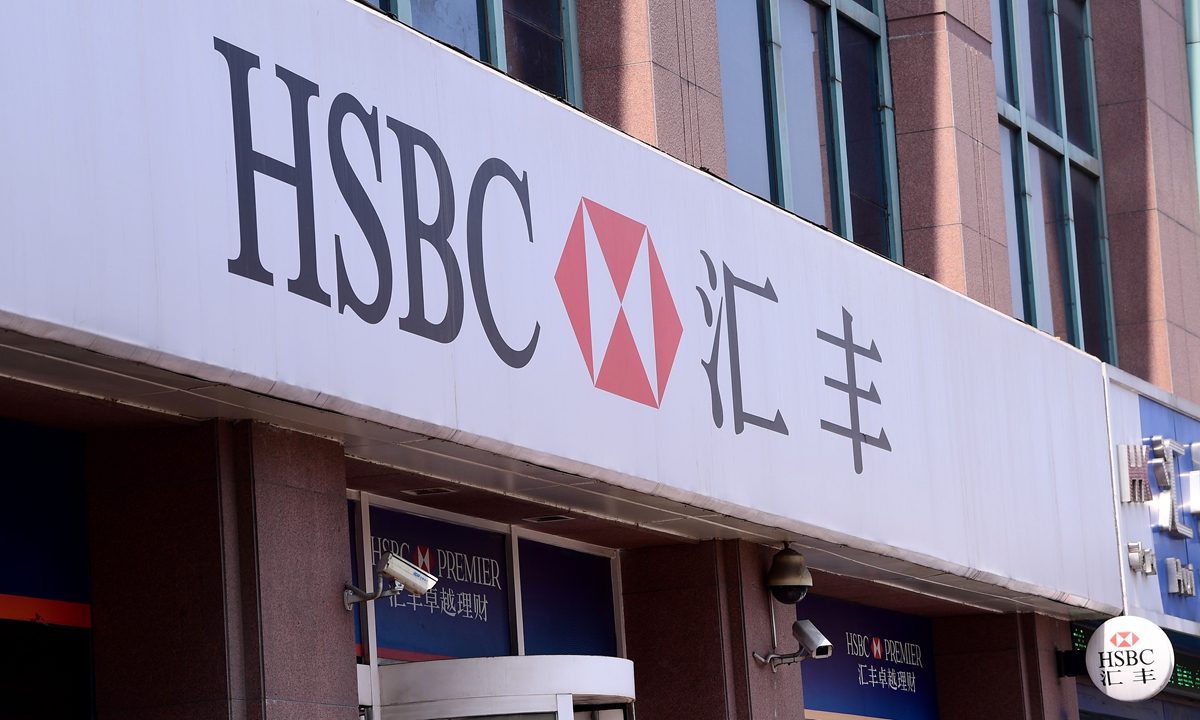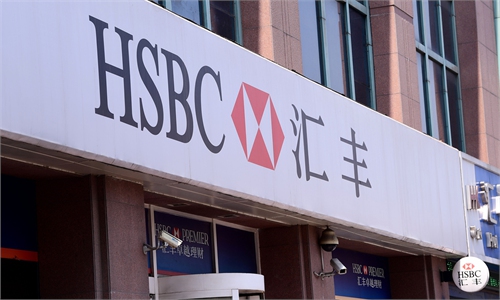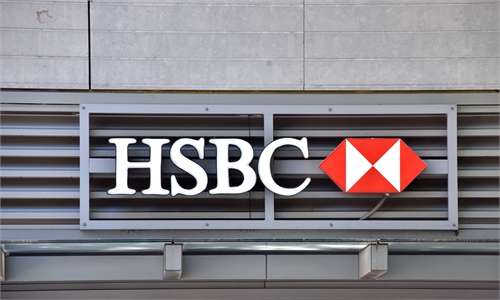
HSBC
UK financial institutions are increasingly pivoting toward China, even as the Johnson government stirs up a series of incidents that have undermined bilateral ties. Chinese analysts call the move a sensible choice that will bring more profit from China's vast and promising market, as well as its sustained growth in the wake of the COVID-19 pandemic.
HSBC is reportedly relocating from its London headquarters three of its top global executives in charge of business groups that contributed 95 percent of the bank's net revenue in 2019 to Hong Kong.
Bank chairman Mark Tucker said at a recent conference that China's Greater Bay Area, the economic hub of more than 70 million people encompassing Hong Kong and several other southern cities, provides "substantial opportunities."
The bank, citing an annual earnings report due on Tuesday, declined to comment when reached by the Global Times.
Analysts said that HSBC is doing its best to profit from the "China opportunity" while as a whole UK companies and financial institutes need the huge Chinese market to make a profit and get through the hard years following the pandemic.
Dong Shaopeng, a senior research fellow at the Chongyang Institute for Financial Studies of Renmin University of China, said it is sensible for UK companies to pivot toward China, and HSBC will be welcome to do business in the Chinese mainland and Hong Kong - provided that it follows local laws.
HSBC has been blamed for its slowness in showing support for the national security law, and for an alleged role in funding Hong Kong rioters in 2019, as well as its controversial role in the detention of Huawei's Meng Wanzhou.
HSBC has been facing a dilemma in China over the past few years. On the one hand, it has to rely on the continuing growing profits of its business in the Chinese market - the first one to quickly recover from the COVID-19 outbreak. On the other hand, it needs to step out of the shadow of its controversial role in the detention of Huawei's Meng Wanzhou, which caused damage to its reputation in the market, an observer who closely followed the bank told the Global Times.
"Why in the middle of growing disputes between China and the UK on some issues concerning Xinjiang and Hong Kong, did the British bank still choose to side with China when it comes to the question of interests? Because it indeed understands where the future opportunities and benefits are," the observer said.
Previously, HSBC CEO Noel Quinn refused to question Hong Kong police requests when it agreed to freeze accounts of anti-government activists, a move that has been criticized by some Western analysts as "politically incorrect" about China-related topics.
Those people do not need to be politically correct as they are businessmen, not politicians, the observer noted. Given the previous controversies and rising doubts about the bank's stance on China-related issues, the bank has become very eager to show that it remains "faithful and loyal" to its Chinese consumers to "save face," the observer added.
The "Look East" trend followed by UK-based financial companies comes as China beams with confidence with its swift recovery from the pandemic and sets course on its "dual circulation" growth model, which rebalances the domestic and international markets.
"No pragmatic enterprise would shun the Chinese market," Dong told the Global Times on Monday.
Besides HSBC, more financial institutions from the UK are adding to their bets on China.
The China Securities Regulatory Commission recently received an application from UK-based Schroder Investment Management (Shanghai) Co to set up a mutual fund, according to media reports. The same firm also teamed up with China's Bank of Communications on a joint venture wealth management firm.
The UK, under the influence of the US, has undermined bilateral relations with China with its stances on Hong Kong, China's Xinjiang Uygur Autonomous Region, and the origin of the coronavirus.
The Chinese economy is worth $15 trillion - more than five times that of the UK - and the rising disposable incomes of Chinese people and their growing consumption power offer opportunities for financial services.
UK financial companies also stand to lose from the Johnson government's aggressive approach toward China, as China's financial, manufacturing and services markets are set to be further opened to financial services providers from areas such as Berlin and Paris, after the conclusion of negotiations on EU-China Comprehensive Agreement on Investment.





